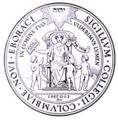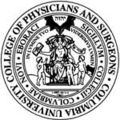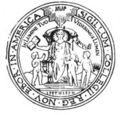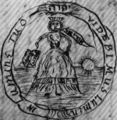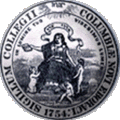Difference between revisions of "Columbia Seal"
Absentminded (talk | contribs) |
Absentminded (talk | contribs) |
||
| Line 1: | Line 1: | ||
| − | The '''Seal of Columbia University''' is the most official [[:Category:Symbols|symbol]] of the university since it carries legal weight. It's used by the [[trustees]] to place their official approval or stamp on something | + | The '''Seal of Columbia University''' is the most official [[:Category:Symbols|symbol]] of the university since it carries legal weight. It's used by the [[trustees]] to place their official approval or stamp on something, e.g. it figures prominently on your [[diplomas]]. |
You can find the seal in a number of places around campus. A large seal is embedded in the floor of [[Low Library]] at the entrance of the Rotunda. The seal can be seen above the stage of the [[Earl Hall]] auditorium. Three versions of the seal can be seen above the entrance of [[Butler Library]]. Directly above the door is center image of the seal. To the left is a seal with the inscription "Colegii Reg" - King's College. To the right is the same seal with the inscription ''Universitatis Stati'' - State University, making reference to Columbia's brief tenure in the 1780's as New York's flagship public school. Additionally, any official documents from the Registrar, such as your transcript has a heat sensitive image of the seal on it, serving as the legal signature of a university official. | You can find the seal in a number of places around campus. A large seal is embedded in the floor of [[Low Library]] at the entrance of the Rotunda. The seal can be seen above the stage of the [[Earl Hall]] auditorium. Three versions of the seal can be seen above the entrance of [[Butler Library]]. Directly above the door is center image of the seal. To the left is a seal with the inscription "Colegii Reg" - King's College. To the right is the same seal with the inscription ''Universitatis Stati'' - State University, making reference to Columbia's brief tenure in the 1780's as New York's flagship public school. Additionally, any official documents from the Registrar, such as your transcript has a heat sensitive image of the seal on it, serving as the legal signature of a university official. | ||
| − | Until 2004, the seal rather than the crown was the university's logo on the [[Columbia Website]]. Traces of this usage can be seen on older web pages, such as [[ | + | Until 2004, the seal rather than the [[Columbia Crown|crown]] was the university's logo on the [[Columbia Website]]. Traces of this usage can be seen on older web pages, such as [[Courseworks]]. Since then Columbia has used the crown on the home page. It is possible that the University is consciously asserting greater control over where the seal is used since it carries legal weight. |
The seal itself is filled with symbolic imagery. Over the head of the seated woman is the (Hebrew) Tetragrammaton, YHVH (Jehovah); the Latin motto around her head means "In Thy light we see light" (Psalm 36:10); the Hebrew phrase on the ribbon is Uri El ("God is my light"), an allusion to Psalm 27:1; and at the feet of the woman is a citation of the New Testament passage commanding Christians to desire the pure milk of God's word (1 Peter 2:1–2).<ref>[http://www.americanvision.org/osafarchive/june2005.asp History Unwrapped – June 2005 (American Vision- A Biblical Worldview Ministry)]</ref> | The seal itself is filled with symbolic imagery. Over the head of the seated woman is the (Hebrew) Tetragrammaton, YHVH (Jehovah); the Latin motto around her head means "In Thy light we see light" (Psalm 36:10); the Hebrew phrase on the ribbon is Uri El ("God is my light"), an allusion to Psalm 27:1; and at the feet of the woman is a citation of the New Testament passage commanding Christians to desire the pure milk of God's word (1 Peter 2:1–2).<ref>[http://www.americanvision.org/osafarchive/june2005.asp History Unwrapped – June 2005 (American Vision- A Biblical Worldview Ministry)]</ref> | ||
| Line 14: | Line 14: | ||
Image:KCSealSketch.jpg|The first known sketch of the King's College Seal | Image:KCSealSketch.jpg|The first known sketch of the King's College Seal | ||
Image:CUSealVariant.gif|A variant of the CU seal, used during the 19th century | Image:CUSealVariant.gif|A variant of the CU seal, used during the 19th century | ||
| + | Image:LowSeal.jpg|The Columbia Seal in Low Library | ||
</gallery> | </gallery> | ||
Revision as of 16:03, 12 September 2007
The Seal of Columbia University is the most official symbol of the university since it carries legal weight. It's used by the trustees to place their official approval or stamp on something, e.g. it figures prominently on your diplomas.
You can find the seal in a number of places around campus. A large seal is embedded in the floor of Low Library at the entrance of the Rotunda. The seal can be seen above the stage of the Earl Hall auditorium. Three versions of the seal can be seen above the entrance of Butler Library. Directly above the door is center image of the seal. To the left is a seal with the inscription "Colegii Reg" - King's College. To the right is the same seal with the inscription Universitatis Stati - State University, making reference to Columbia's brief tenure in the 1780's as New York's flagship public school. Additionally, any official documents from the Registrar, such as your transcript has a heat sensitive image of the seal on it, serving as the legal signature of a university official.
Until 2004, the seal rather than the crown was the university's logo on the Columbia Website. Traces of this usage can be seen on older web pages, such as Courseworks. Since then Columbia has used the crown on the home page. It is possible that the University is consciously asserting greater control over where the seal is used since it carries legal weight.
The seal itself is filled with symbolic imagery. Over the head of the seated woman is the (Hebrew) Tetragrammaton, YHVH (Jehovah); the Latin motto around her head means "In Thy light we see light" (Psalm 36:10); the Hebrew phrase on the ribbon is Uri El ("God is my light"), an allusion to Psalm 27:1; and at the feet of the woman is a citation of the New Testament passage commanding Christians to desire the pure milk of God's word (1 Peter 2:1–2).[1]
Gallery
The Columbia College Seal (used by the University)
The College of Physicians and Surgeons Seal
